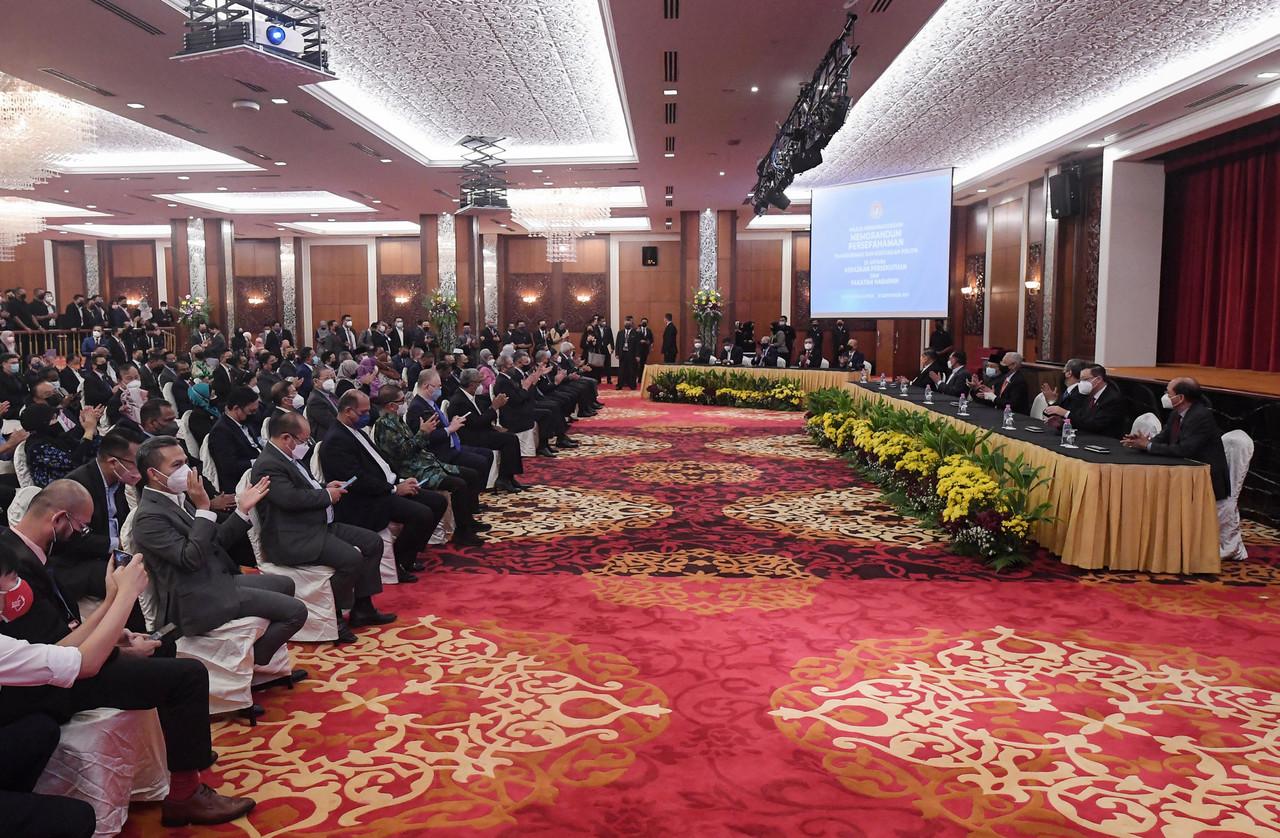Govt-opposition deal will neutralise court cluster, say analysts
Political observers say it will be difficult for 'kleptocrats' to sabotage the government if its cooperation with Pakatan Harapan goes as planned.
The historic memorandum of understanding (MoU) inked by the government and the opposition this week could neutralise the Umno “court cluster”, denying any attempt at disrupting stability ahead of the 15th general election (GE15), political observers say.
Ahmad Marthada Mohamed of Universiti Utara Malaysia said through the agreement, the opposition would commit to and thus indirectly provide strong support for the government even without the backing of the court cluster.
“Previously, it was the court cluster that foiled that government’s attempts at bringing about transformation,” Marthada told MalaysiaNow.
“Meanwhile, the opposition did not support the government as it had no incentive to do so.
“With the MoU, any efforts by the court cluster to destabilise the government will be fruitless.”
The MoU was signed by MPs from Perikatan Nasional (PN) and Pakatan Harapan (PH) on Monday in a move described by Prime Minister Ismail Sabri Yaakob as “consultative democracy”.
The agreement was signed by Ismail and top PH leaders Anwar Ibrahim, Mohamad Sabu, Lim Guan Eng and Upko’s Wilfred Madius Tangau.
“With the MoU, any efforts by the court cluster to destabilise the government will be fruitless.”
The court cluster refers to a group of Umno MPs led by former prime minister Najib Razak and party president Ahmad Zahid Hamidi who are facing charges in court for corruption, abuse of power and criminal breach of trust.
The group was behind the resignation of Ismail’s predecessor Muhyiddin Yassin, who lost his fragile majority after some 15 MPs withdrew their support for him.
Prior to his resignation, Muhyiddin had offered to implement a list of reforms similar to those recently presented by Ismail in exchange for support from the opposition. However, PH rejected the offer, calling it a form of open bribery.
The MoU on Monday had covered six aspects, namely the Malaysia Agreement 1963 (MA63) on the rights of Sabah and Sarawak, the empowerment of the Covid-19 plan, administrative transformation, parliamentary reforms, freedom of the judiciary and the formation of a steering committee.
Marthada said the ideas brought by Muhyiddin had been forward-looking but were hampered by “kleptocrats” who had sabotaged his administration.
“With this offer of cooperation, we have a win-win situation,” he said. “It is also important in terms of the government’s legitimacy. This MoU shows that the government of the day is also supported by the opposition, albeit indirectly.
“I believe the budget for 2022 will be passed, and that there will be no vote of confidence.”
However, he warned that the success of the agreement hinges on those who signed it.
Sarawak political observer Jeniri Amir said as far as MA63 is concerned, efforts to restore the rights of the East Malaysian states would move more quickly with the support of all sides.
“The MoU will strengthen the efforts of the previous government,” he said.
“During PH’s administration, parties outside of the coalition did not agree with its decisions.
“With this agreement, all obstacles can be overcome,” he told MalaysiaNow.
Even though Pejuang and Warisan had not signed the MoU on Monday, he added, they should support efforts to restore the rights of Sabah and Sarawak.
“Many of the transformation initiatives were also part of PH’s election manifesto for GE14,” he said.
“So they should support it without playing games or giving excuses.”
Jeniri said the bigger issue would be the formation of a more level political playing field where the government would no longer suppress the opposition or dissenting voices.
“We don’t want any discrimination against the opposition or its supporters to the point where there are delays in terms of physical development and the economy in opposition-held areas,” he said.
“This would be in line with a mature and progressive democracy,” he added. “Every voter should be treated fairly.”
Subscribe to our newsletter
To be updated with all the latest news and analyses daily.
